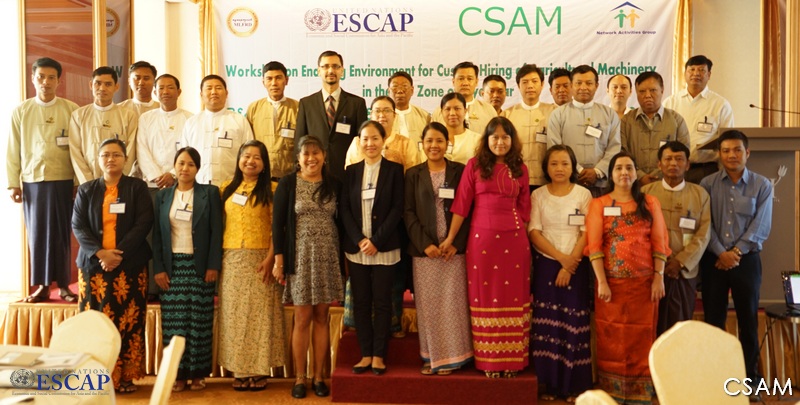CSAM kicked off the capacity building activities under the LIFT funded project, 30 November- 1 December 2015, Mandalay, Myanmar

On November 30, 2015, CSAM kicked off the capacity building activities under the LIFT (Livelihoods and Food Security Trust Fund) funded project, titled 'An Integrated Rural Economic and Social Development Programme for Livelihoods Improvement in the Dry Zone of Myanmar'. The knowledge-sharing workshop, themed on 'Enabling Environment for Custom Hiring of Agricultural Machinery in the Dry Zone of Myanmar', had attracted nominations from line Ministries, regional and township government offices, research institutions, private machinery suppliers and NGOs. 23 participants were selected for the final participation in Mandalay, Myanmar.
The project is led by the Center for Alleviation of Poverty through Sustainable Agriculture (CAPSA-ESCAP) in partnership with the Asian and Pacific Center for Transfer of Technologies (APCTT), the Center for Sustainable Agricultural Mechanization (CSAM) and the Network Activities Groups (NAG). The Department of Rural Development of the Ministry of Livestock, Fisheries and Rural Development of Myanmar (DRD-MLFRD) has been designated as the focal government agency to collaborate in the project implementation.
Under the unified focus of 'Climate Resilient Agriculture', the workshop shared case studies on policies/institutions/processes (PIPs) to support custom hiring of agricultural machinery and stakeholder mapping of custom hiring of agricultural machinery in the region, provided a conceptual framework for the enabling environment for custom hiring services and shared prevailing practices in Asia and the Pacific region.
Participants from different sectors and organizations actively shared their opinions and feedback on the topic during the workshop. Besides having shared information and knowledge, the workshop increased awareness of the participants on the benefits and challenges associated with custom hiring and its contribution to climate resilient agriculture, provided an improved evidence base and completed conceptual framework to help with policy formulation and enforcement by different level of policymakers and improved mutual understanding among the participants from different sectors and organizations in facilitating and managing custom hiring of agricultural machinery in the Dry Zone of Myanmar.
The project includes a wide range of activities including the establishment of a knowledge resource network, the development of case studies, policy papers and policy briefs, as well as the organization of technique workshops and policy dialogues. Six technique workshops in three thematic areas are expected to be organized in 2015 and 2016.
